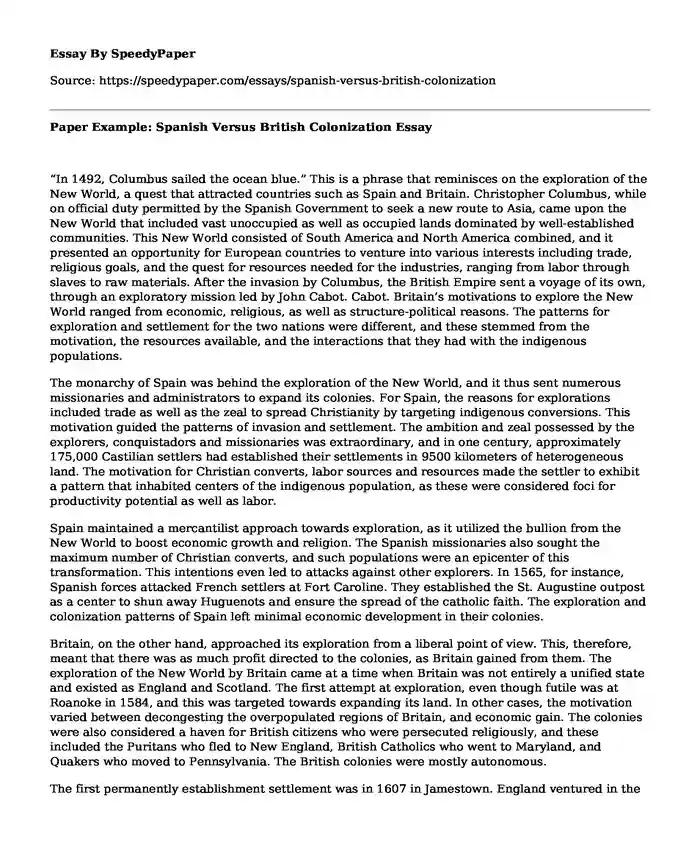
| Type of paper: | Essay |
| Categories: | Christianity Christopher Columbus American history |
| Pages: | 3 |
| Wordcount: | 787 words |
“In 1492, Columbus sailed the ocean blue.” This is a phrase that reminisces on the exploration of the New World, a quest that attracted countries such as Spain and Britain. Christopher Columbus, while on official duty permitted by the Spanish Government to seek a new route to Asia, came upon the New World that included vast unoccupied as well as occupied lands dominated by well-established communities. This New World consisted of South America and North America combined, and it presented an opportunity for European countries to venture into various interests including trade, religious goals, and the quest for resources needed for the industries, ranging from labor through slaves to raw materials. After the invasion by Columbus, the British Empire sent a voyage of its own, through an exploratory mission led by John Cabot. Cabot. Britain’s motivations to explore the New World ranged from economic, religious, as well as structure-political reasons. The patterns for exploration and settlement for the two nations were different, and these stemmed from the motivation, the resources available, and the interactions that they had with the indigenous populations.
The monarchy of Spain was behind the exploration of the New World, and it thus sent numerous missionaries and administrators to expand its colonies. For Spain, the reasons for explorations included trade as well as the zeal to spread Christianity by targeting indigenous conversions. This motivation guided the patterns of invasion and settlement. The ambition and zeal possessed by the explorers, conquistadors and missionaries was extraordinary, and in one century, approximately 175,000 Castilian settlers had established their settlements in 9500 kilometers of heterogeneous land. The motivation for Christian converts, labor sources and resources made the settler to exhibit a pattern that inhabited centers of the indigenous population, as these were considered foci for productivity potential as well as labor.
Spain maintained a mercantilist approach towards exploration, as it utilized the bullion from the New World to boost economic growth and religion. The Spanish missionaries also sought the maximum number of Christian converts, and such populations were an epicenter of this transformation. This intentions even led to attacks against other explorers. In 1565, for instance, Spanish forces attacked French settlers at Fort Caroline. They established the St. Augustine outpost as a center to shun away Huguenots and ensure the spread of the catholic faith. The exploration and colonization patterns of Spain left minimal economic development in their colonies.
Britain, on the other hand, approached its exploration from a liberal point of view. This, therefore, meant that there was as much profit directed to the colonies, as Britain gained from them. The exploration of the New World by Britain came at a time when Britain was not entirely a unified state and existed as England and Scotland. The first attempt at exploration, even though futile was at Roanoke in 1584, and this was targeted towards expanding its land. In other cases, the motivation varied between decongesting the overpopulated regions of Britain, and economic gain. The colonies were also considered a haven for British citizens who were persecuted religiously, and these included the Puritans who fled to New England, British Catholics who went to Maryland, and Quakers who moved to Pennsylvania. The British colonies were mostly autonomous.
The first permanently establishment settlement was in 1607 in Jamestown. England ventured in the New World later than the other European countries, and by the time of its first exploration, much of the land from the New World had been taken by the Spaniards, Dutch and French settlers. The tardiness was a result of poor economic development during that time created by religious factions and wrangles. The need to look for freedom from religious prosecution, therefore, made most of Britain colonies to be clustered alongside the shores and borders.
In conclusion, the exploration of the New World by Spain and Britain varied significantly in terms of the settlement patterns and motivations. Spain looked for economic gain through a mercantilist approach, and this made them look to settle in already occupied regions. Britain, on the other hand, sought resettlement, and it late venture limited its settlements to shores and borders.
Bibliography
Butzer W. Karl. Spanish Colonization of the New World: Cultural Continuity and Change in Mexico. Erdkunde, vol. 45, Hno. 3 (Sep., 1991), pp. 205-219. http://sites.utexas.edu/butzer/files/2017/03/Butzer-1991-Spanish-Colonization-of-the-New-World.pdf
Lange Matthew, Mahoney James, and vom Hau Matthias. "Colonialism and Development: A Comparative Analysis of Spanish and British Colonies," American Journal of Sociology vol. 111, no. 5 (March 2006): 1412-1462. https://doi.org/10.1086/499510
Lumen learning. European Encounters with the New World. Top of FormBottom of FormThe Exploration and Conquest of the New World. https://courses.lumenlearning.com/boundless-ushistory/chapter/the-exploration-and-conquest-of-the-new-world/
Norwich University Online. Colonization of the New World. Academic programs. December 1, 2015. Accessed on https://online.norwich.edu/academic-programs/resources/colonization-of-the-new-world
US History. Britain in the New World: Pre-Columbian to the New Millennium. Accessed on https://www.ushistory.org/us/2.asp
Cite this page
Paper Example: Spanish Versus British Colonization. (2023, Aug 29). Retrieved from https://speedypaper.com/essays/spanish-versus-british-colonization
Request Removal
If you are the original author of this essay and no longer wish to have it published on the SpeedyPaper website, please click below to request its removal:
- Essay Example on Biblical View of Food
- American Society at Different Points of American History
- Amiri Baraka Conversion to Islam and Influence of Other Ideologies, Poetry Essay Example
- The Church on Cultural Divide, Free Essay for You
- Essay Sample. What Is in a Good Sermon Construction
- Essay Sample on The Wilsonian Movement
- Essay Sample on To Walk in Dignity: The Montgomery Bus Boycott. Magazine of History
Popular categories




